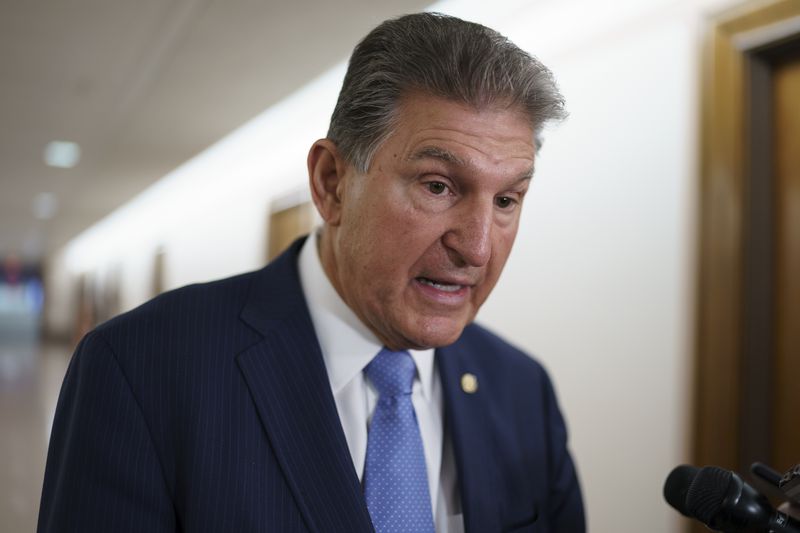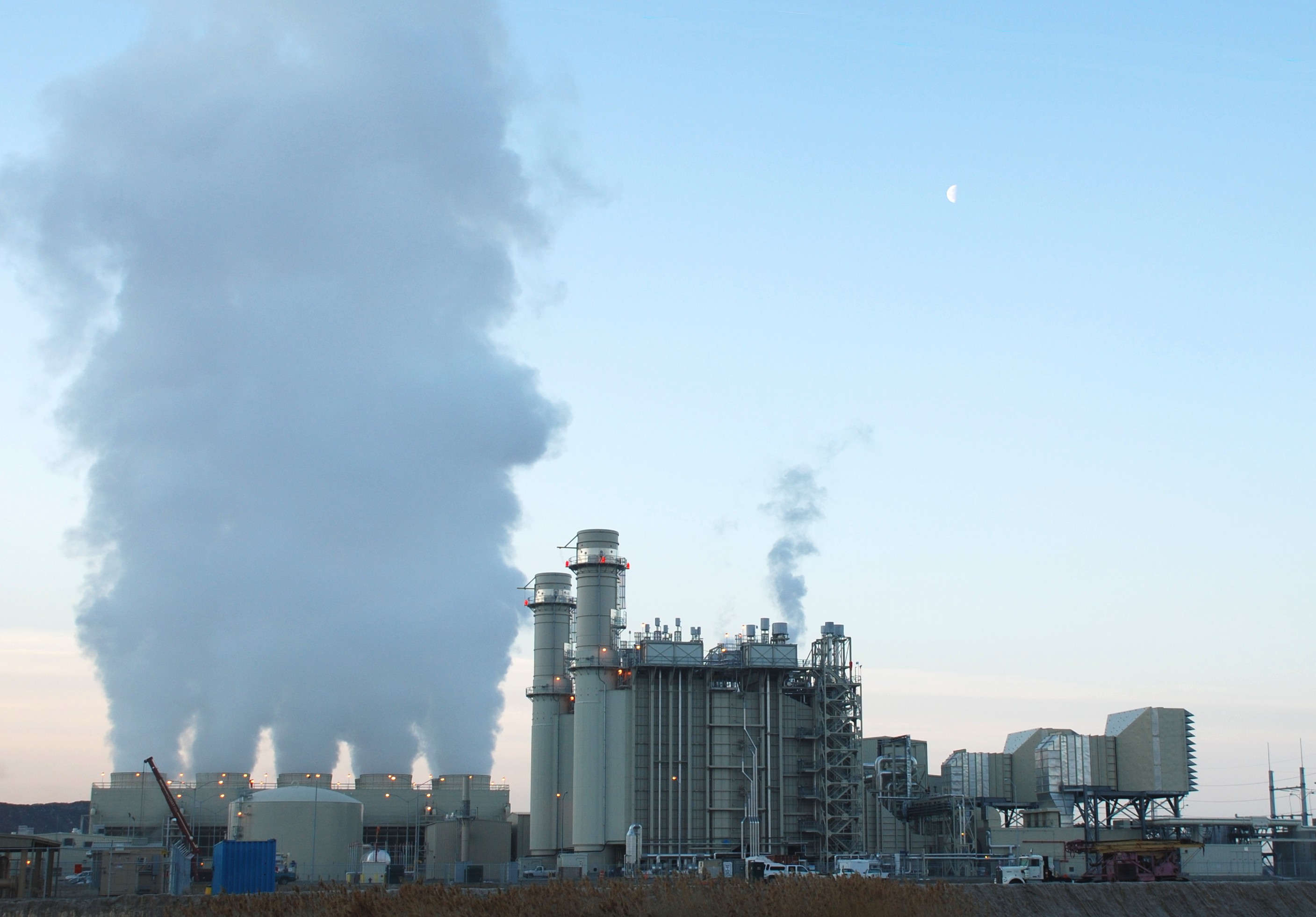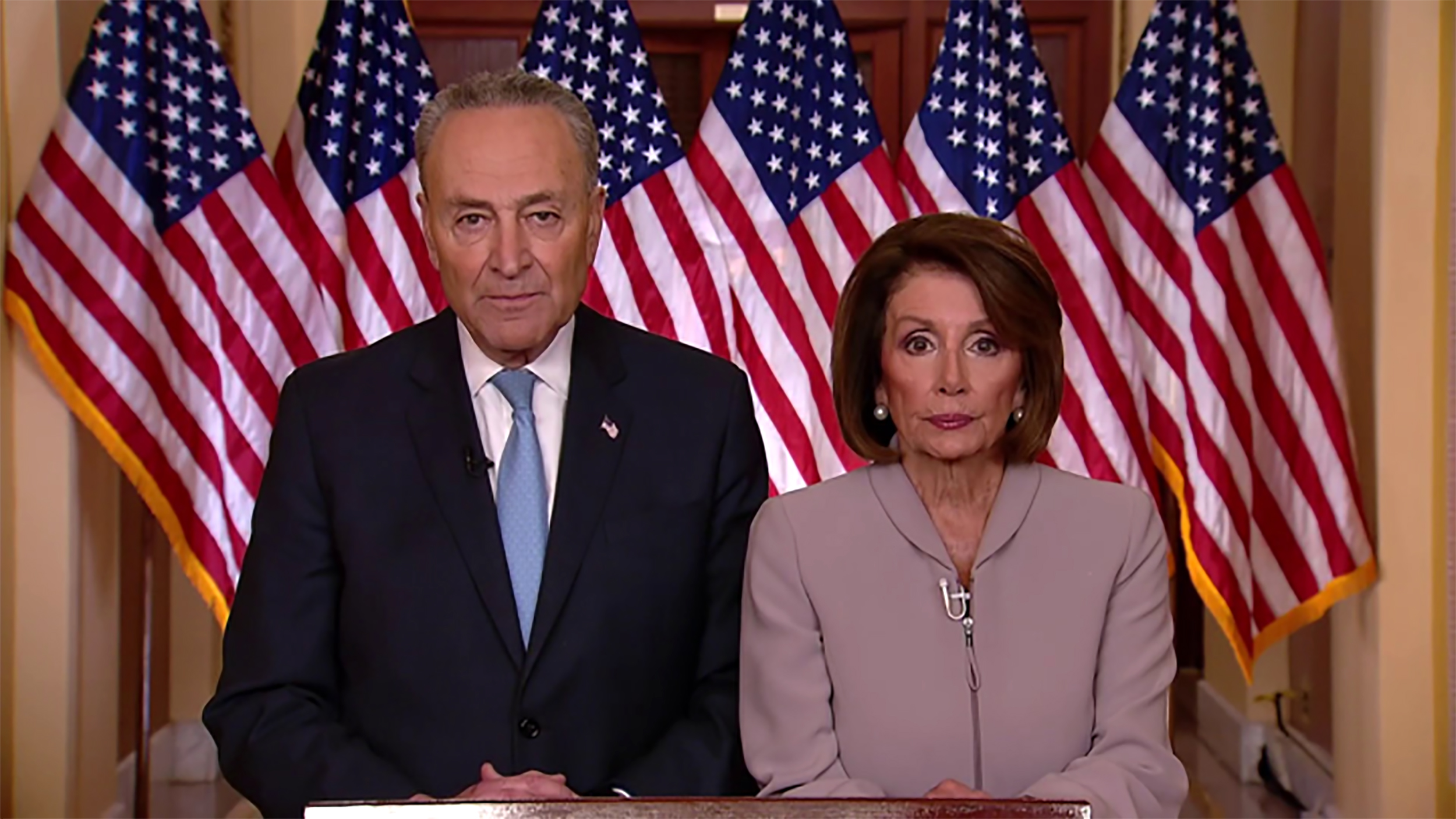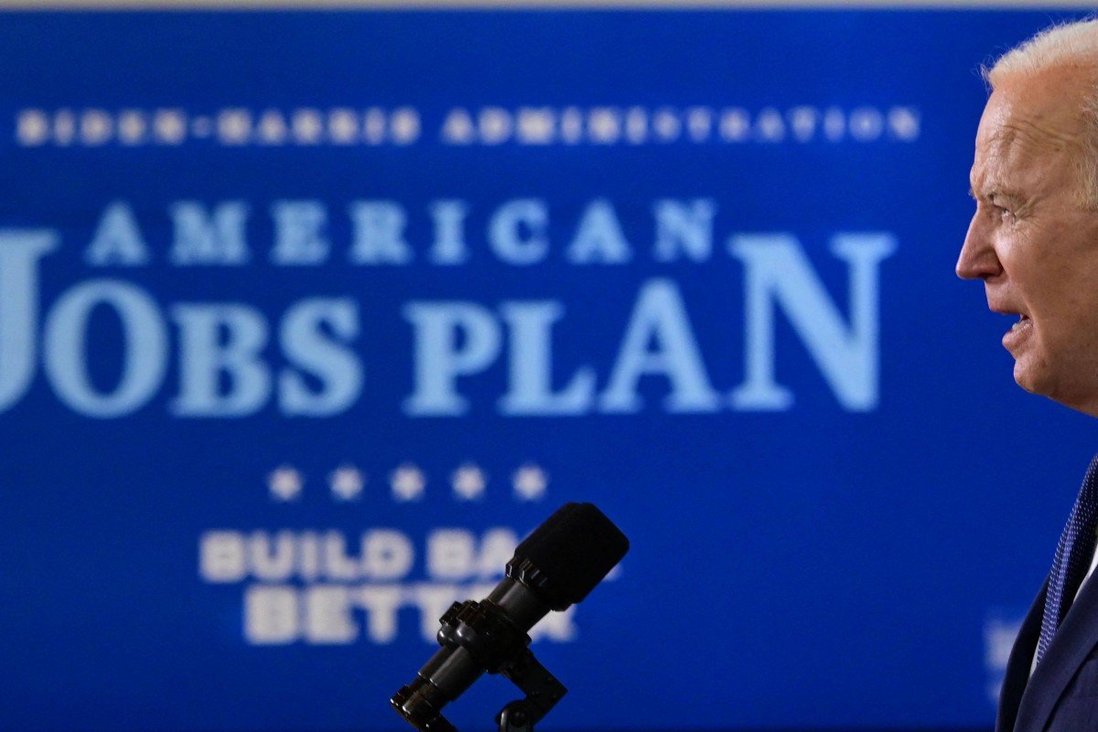Analysis: $95 Billion Manchin Energy Infrastructure Act Is Heavily Biased Against Renewable Energy
 Sen. Joe Manchin (D-W.V.), the chair of the Senate energy committee, has released the text of his Energy Infrastructure Act, which will undergo committee markup tomorrow.
Sen. Joe Manchin (D-W.V.), the chair of the Senate energy committee, has released the text of his Energy Infrastructure Act, which will undergo committee markup tomorrow.
An analysis by Friends of the Earth finds only $410 million in funding for renewable wind, solar, geothermal and tidal energy but nearly $30 billion for non-renewable energy programs.
Even the investments in storage and energy efficiency are less than half of spending in polluting energy.
The legislation proposes to make $95 billion in infrastructure investments mainly concentrated in the energy sector. But a close look at exactly where the money is going to go reveals an undeniable bet on dirty energy from the 20th century over clean energy from the 21st. In fact, the bill authorizes $28.8 billion in nuclear, carbon capture and dirty hydrogen over only $410 million in direct authorizations for wind, solar, geothermal and tidal. That’s a ratio of dirty to renewables of over 70-to-1. Even when combining the renewable provisions with the bill’s meager storage and efficiency programs, Manchin still proposes spending twice as much on dirty than he does on clean.
Most of the language for the carbon capture text was taken from the SCALE (Storing CO2 and Lowering Emissions) Act from Sen. Christopher Coons (D-Del.).
The nuclear provisions were drawn from the American Nuclear Infrastructure Act from Sen. John Barrasso (R-Wyo.).
The fossil & polluting energy provisions include:- $12.6 billion for carbon capture projects, including financing for carbon-dioxide pipelines used for enhanced oil recovery to extend the life of oil wells.
- $6 billion for subsidy payments to the nuclear industry to extend the lifetime of aging plants past economic viability.
- $7 billion in research and development from hydrogen programs; 95 percent of hydrogen production is from fracked gas.
- $1.9 billion in subsidies for commercial logging on public lands
- $6 billion for battery production: minerals mining, processing, manufacturing, and recycling
- $3.5 billion for the low-income energy efficiency efforts under the Weather Assistance Program
In addition, there is a further giveaway to the coal industry worth hundreds of millions of dollars in the text: a 20% cut to the Abandoned Mine Land fee paid by the coal industry.
Senior ExxonMobil lobbyist Keith McCoy revealed to a journalist posing as a corporate recruiter that Manchin holds weekly calls with Exxon. He named Coons and Barrasso as two other “crucial” allies to the oil giant’s agenda.
Democratic Climate Groups Release $10 Million Clean-Energy Jobs Ad Campaign
The Democratic Party-aligned organizations Climate Power and the League of Conservation Voters (LCV) have begun a $10 million spend on television spots to promote the Biden infrastructure plan with a clean-energy jobs message. This effort is part of a broader $28 million “Great American Build” campaign.
The new ads are airing on national cable and the Washington D.C. market, as well as the local markets of 23 congressional swing districts held by Democrats.
Climate Power is a joint effort of the Center for American Progress Action Fund, League of Conservation Voters, and the Sierra Club, with an advisory board of Democratic and environmentalist luminaries.
Four states:- Arizona (Kelly and Sinema)
- Georgia (Ossoff and Warnock)
- New Hampshire (Hassan and Shaheen)
- Nevada (Cortez Masto and Rosen)
- AZ-01 (O’Halleran)
- GA-06 (McBath)
- GA-07 (Bourdeaux)
- IA-03 (Axne)
- IL-14 (Underwood)
- KS-03 (Davids)
- ME-02 (Golden)
- MI-08 (Slotkin)
- MI-11 (Stevens)
- MN-02 (Craig)
- NH-01 (Pappas)
- NJ-03 (Kim)
- NJ-07 (Malinowski)
- NJ-11 (Sherrill)
- NV-03 (Lee)
- NV-04 (Horsford)
- NY-19 (Delgado)
- OR-04 (DeFazio)
- PA-07 (Wild)
- PA-08 (Cartwright)
- VA-02 (Luria)
- VA-07 (Spanberger)
- WI-03 (Kind)
Manchin Announces His Plan to Cede Control of Senate to "100% Wrong" Mitch McConnell
 Over the weekend, Sen. Joe Manchin (D-W.V.) embraced the Republican filibuster, giving Senate Minority Leader Mitch McConnell (R-Ky.) veto power over all future legislation.
Over the weekend, Sen. Joe Manchin (D-W.V.) embraced the Republican filibuster, giving Senate Minority Leader Mitch McConnell (R-Ky.) veto power over all future legislation.
Manchin, the chair of the Senate Committee on Energy and Natural Resources, penned an essay in the Charleston Gazette-Mail unequivocally stating, “I will not vote to weaken or eliminate the filibuster.”
Current Senate rules require 60 votes to overcome the filibuster, which gives Republicans veto power in the 50-50 Senate. In May, McConnell announced that “One-hundred percent of our focus is on stopping this new administration.”
In an interview with Fox News’s Chris Wallace on Sunday, Manchin sharply criticized McConnell’s partisan obstruction: “I think he’s 100% wrong in trying to block all the good things that we’re trying to do for America.”
In his essay, Manchin repeatedly invoked the possibility of bipartisanship as his justification for rejecting legislation such as the voting-rights For the People Act (H.R. 1).
However, Manchin also admitted there are only seven Republicans, not ten, that are willing to even potentially break with Mitch McConnell or Donald Trump.Are the very Republican senators who voted to impeach Trump because of actions that led to an attack on our democracy unwilling to support actions to strengthen our democracy
Manchin’s low threshhold for bipartisanship – opposing Trump’s incitement of insurrection that led to an assault on the Senate chambers – was met by only seven Republicans. The vote required a 2/3 majority to convict Trump, but failed 57-43.
Manchin said to Wallace he’s aware of the numbers: “[W]e have seven brave Republicans that continue to vote for what they know is right and the facts as they see them, not worrying about the political consequences.”
He has not explained how 57 votes is sufficient to break a filibuster, since it’s not.
To wit: at the end of May, McConnell and 34 other Republicans successfully filibustered the legislation to create a bipartisan committee to investigate the attack on our democracy.
Analysis: CLEAN Future Act's Clean Energy Standard Is Designed To Fail
 An independent analysis of the CLEAN Future Act (H.R. 1512) finds that its provisions intended to phase out fossil-fueled electricity production by 2035 are dangerously flawed.
An independent analysis of the CLEAN Future Act (H.R. 1512) finds that its provisions intended to phase out fossil-fueled electricity production by 2035 are dangerously flawed.
The so-called Clean Electricity Standard in Title II of the legislation establishes a cap-and-trade system of “zero-emission electricity” tradable credits for electricity generators. The cap of allowances for greenhouse-pollution-emitting electricity declines until 2035, when all electricity is meant to be “zero-emission,” a definition which encompasses renewable and nuclear energy.
In “Review of the Credit Trading System in Title II of the CLEAN Future Act,” Bruce Buckheit, a former director of the EPA Air Enforcement Division, finds that the system “is flawed to the point that it is unlikely to achieve zero emission electricity from the power sector by 2035.”
Specifically:The CLEAN Future Act draft (dCFA) defers any serious disincentives for gas-fired generation until 2031 and then hopes to replace all of the growing gas-fired electric generating unit (EGU) fleet with renewable energy (RE) over a short 4-year period. This is not feasible and sets itself up for failure.The starting baseline for “Zero Emission Electricity” (ZEE) requirements is based on the 2017-2019 generating mix. This ignores ongoing retirements of coal plants and RE capacity that is under construction today and will be online in 2023. The consequence is a large initial surplus of ZEE, disincentivizing necessary early investment in non-fossil fuel energy.
He expects that “gas-reliant regions, such as the Northeast U.S., might not have to take any significant action until 2031.”
Furthermore, Buckheit finds that the legislation as written doesn’t even require “zero-emission” electricity, but instead “permits generation at less than 0.4 mt (882 lb) CO2e/MWh.”
He also notes that, given regulatory timelines, the “trading system cannot begin to operate in 2023 as the draft bill contemplates.”
Progressive Organizations Call For Clean Energy Standard Without "False Solutions"
 A broad coalition is asking the U.S. Congress to ensure any clean electricity standard (CES) passed into law be a renewable standard, which includes only renewable resources, particularly solar and wind energy, and excludes natural gas, biomass, and new nuclear plants.
A broad coalition is asking the U.S. Congress to ensure any clean electricity standard (CES) passed into law be a renewable standard, which includes only renewable resources, particularly solar and wind energy, and excludes natural gas, biomass, and new nuclear plants.
Major signatories to the letter to Democratic congressional leaders include 350.org, Indigenous Environmental Network, the NAACP, Public Citizen, Friends of the Earth, the Center for Biological Diversity, Food & Water Watch, Black Lives Matter Global Network Foundation, National Family Farm Coalition, Mothers Out Front, GreenLatinos, Greenpeace, Labor Network for Sustainability, Stand.Earth, California Environmental Justice Alliance, Oil Change International and The Democracy Collaborative.
The letter addresses provisions in the text of the Climate Leadership and Environmental Action for our Nation’s (CLEAN) Future Act (H.R. 1512), which admits gas and carbon capture and storage as qualifying energies. The letter cites an analysis of the CLEAN Future Act’s CES credit-trading system, which finds that the bill offers “little incentive for operators with a full mix of generation to replace gas with renewable energy until 2035, since they get a much better benefit from retiring coal.”
The signatories write:The definition [of clean energy] must exclude all fossil fuels and false solutions, including but not limited to: gas with and without carbon capture and storage and other fossil-based technologies; waste incineration and other combustion-based technologies; bioenergy including biomass, biofuels, factory farm gas, landfill gas, and wood pellets; new nuclear; and new, large-scale and ecosystem-altering hydropower, and all market-based accounting systems like offsets. Energy efficiency and demand-side management technologies must also be paired with renewable energies to vastly reduce energy consumption.
Writing for Politico, Michael Grunwald criticized the signatories as a “circular firing squad” of “utopian” “eco-purists” engaging in “political lunacy.” The only named critic of the letter he quoted was Data For Progress’s Julian Brave Noisecat (“There’s just no reason to take positions that aren’t politically defensible in Congress, and probably aren’t even technically defensible”).
Politico not only accepts advertising and sponsorship from corporate polluters but also collaborates with them on lobbying events.
Robinson Meyer, a journalist at the Atlantic, was similarly dismissive. Like Politico, the Atlantic collaborates with the fossil-fuel industry on lobbying and propaganda.
Text of the letter:
Senate Committee Moves Carbon Market Bill Backed by Industrial Agriculture Titans Closer to Passage
 On Thursday, Earth Day 2021, the Senate Agriculture Committee unanimously approved by voice vote the Growing Climate Solutions Act of 2021 (S. 1251), which would expand voluntary agricultural carbon sequestration markets under private control.
On Thursday, Earth Day 2021, the Senate Agriculture Committee unanimously approved by voice vote the Growing Climate Solutions Act of 2021 (S. 1251), which would expand voluntary agricultural carbon sequestration markets under private control.
“On Earth Day, our committee came together in a bipartisan way to pass the Growing Climate Solutions Act,” said Sen. Debbie Stabenow (D-Mich.). “This brings us one step closer to providing more opportunities for farmers and foresters to lead in addressing the climate crisis and also benefit from new streams of income.”
The legislation was introduced by Stabenow and Mike Braun (R-Ind.) with the support of the biggest corporations in industrial agriculture, including Cargill, Bayer, McDonald’s, Archer Daniels Midland, General Mills, and Syngenta, as well as Big Ag lobbying groups like the American Farm Bureau and the US Chamber of Commerce. Corporate-funded-and-allied environmental organizations like the Center for Climate and Energy Solutions, Climate Leadership Council, and the Environmental Defense Fund are also supporting the bill.
Agribusiness has contributed $2,546,199 to Stabenow and $367,483 to Braun over their careers.
The bill now has 42 co-sponsors in the Senate, ranging from climate hawk Sen. Sheldon Whitehouse (D-R.I.) to climate denier Tommy Tuberville (R-Ala.).
Companion legislation was introduced yesterday in the House of Representatives by Reps. Abigail Spanberger (D-Va.) and Don Bacon (R-Neb.). Agribusiness has contributed $198,675 to Spanberger and $478,040 to Bacon over their careers.
Other original co-sponsors of the House bill are Reps. Chellie Pingree (D-Maine), Elise Stefanik (R-N.Y.), Ben Ray Luján (D-N.M.), Jeff Fortenberry (R-Neb.), Paul Tonko (D-N.Y.), Jim Baird (R-Ind.), John Katko (R-N.Y.), and Josh Harder (D-Calif.).
Advocates for small farmers, sustainable agriculture, and aggressive climate action criticized the legislation. In 2020, the Institute for Agriculture and Trade Policy’s Tara Ritter explained how the bill works:
Although farmers should be incentivized to adopt practices that boost resilience and sequester carbon, carbon markets have a failed and wasteful track record compared to public investments in proven conservation programs. This bill would tee up a framework incentivizing false solutions to climate change that benefits private companies over farmers. . .Voluntary carbon markets are privately-run schemes that pay farmers for carbon sequestered in their soils to generate carbon credits. Then, the company running the carbon market sells those credits to other companies or individuals interested in reducing their carbon footprint. Companies such as Indigo Ag and Nori are starting up voluntary carbon markets, claiming that they will increase farm profits while addressing climate change, all without imposing government regulations on farmers. Yet, Indigo Ag also plans to sell farmers proprietary seed coatings and collect farm data, raising questions of who will benefit most. Unsurprisingly, some of the biggest backers of these schemes are large agribusiness companies, including ADM, Bunge, Cargill and more, that will be able to generate, buy and sell carbon credits to boost their profits and greenwash their own operations.
The Growing Climate Solutions Act sets up a weak verification system for the markets. The system relies on third-party entities to both provide technical assistance and verify the carbon credits. Allowing an entity to both consult on best practices and certify adherence to those practices could lead to conflicts of interest. In addition, verifying entities may self-register in the program simply by notifying USDA that they will “maintain expertise in and adhere to the standards published.” This type of self-reporting will almost certainly be abused, and without strict enforcement it will weaken the results of already flawed carbon markets.
Jason Davidson, Senior Food and Agriculture Campaigner for Friends of the Earth, responded to the committee’s approval of the bill:
We already have policies that will help farmers enhance soil health, protect biodiversity, and combat the climate crisis without perpetuating environmental injustice. Carbon markets have failed to reduce emissions and failed to provide opportunities for America’s family farmers.Ecologically regenerative farming should be incentivized in addition to, and not instead of, carbon reductions in the energy sector. We should increase incentives for organic transition and heavily invest in existing successful USDA conservation programs while retooling them to help producers sequester carbon. Congress should support existing USDA technical assistance programs rather than outsource them to polluting agribusiness giants like Bayer. Family farmers should be supported in these efforts with structural reforms that ensure fair markets and fair prices, rather than creating more false promises of new markets that will predominantly benefit Big Ag.
“There are better bills on the table to meet the goals of maximizing soil carbon sequestration and reducing emissions from agriculture,” Ritter wrote, “including Representative Chellie Pingree’s (D-Maine) Agriculture Resilience Act and Senator Cory Booker’s (D-N.J.) Climate Stewardship Act.”
Markey and Ocasio-Cortez Introduce Civilian Climate Corps Act of 2021
 Today, Sen. Ed Markey (D-Mass.) and Rep. Alexandria Ocasio-Cortez (D-N.Y.) are introducing the Civilian Climate Corps for Jobs and Justice Act of 2021. The act establishes the Civilian Climate Corps (CCC), to be administered by the Corporation for National and Community Service within AmeriCorps.
Today, Sen. Ed Markey (D-Mass.) and Rep. Alexandria Ocasio-Cortez (D-N.Y.) are introducing the Civilian Climate Corps for Jobs and Justice Act of 2021. The act establishes the Civilian Climate Corps (CCC), to be administered by the Corporation for National and Community Service within AmeriCorps.
Over five years, 1.5 million Americans in the CCC will complete federally-funded projects that help communities respond to climate change and transition to a clean economy. CCC work will reduce carbon pollution, enable a transition to renewable energy, build healthier and more resilient communities, implement conservation projects with proven climate benefits, and help communities recover from climate disasters.
Corpsmembers will receive education and training in coordination with local institutions, including labor unions, and will coordinate closely with local groups to help develop career pathways and union opportunities in new green sectors.
Markey and Ocasio-Cortez discussed the bill on the National Mall today:
The CCC will administer a large national service program and provide simplified and enhanced grants to scale up the existing network of over 130 local and state service and conservation corps.
All corpsmembers are guaranteed the following benefits:- Salary and benefits: Compensation of at least $15 per hour, full health care coverage, and critical support services such as transportation, housing, and childcare.
- Educational Funding: Enabling educational grants of $25,000 per year of service, up to $50,000, eligible for further education at any level or to pay down student debt.
- Career Opportunities: Corps will prioritize registered pre-apprenticeship curricula and union membership as part of service. Corpsmembers will receive vocational training appropriate to the local job market.
- Explicit antiracist language ensures that environmental justice communities receive benefits of at least 50% of CCC and Partner Corps projects, and 50% of corpsmembers will be recruited from these same communities, with no age limit for participation in at least 50% of Partner Corps.
- Labor groups will beintegrated into CCC and Partner Corps planning and operations, with DOL registered pre-apprenticeship and apprenticeship programs prioritized for grants, required coordination with local labor unions, buy American provisions in procurement, and advisory board representation from labor groups. The corps, partner corps, and any private companies partnered in corps activities will adhere to neutrality and card check agreements.
- Tribal communities will receive 10% of the dedicated EJ benefits.
- Weatherizing and retrofitting residential and non-residential buildings for energy efficiency and electrification and participating in the construction of new net-zero buildings
- Maintenance and operation of energy-efficient and net zero buildings and properties
- Building energy-efficient affordable housing units
- Conducting energy audits
- Recommending ways for households to improve energy efficiency
- Installing and upgrading public transit and electric vehicle infrastructure
- Installing clean energy infrastructure in homes and small businesses, on farms, and in communities
- Advising on climate and energy policy
- Providing clean energy-related services
- Expanding broadband access and adoption
- Working with schools and youth programs to educate students and youth about ways to reduce home energy use and improve the environment
- Assisting in the development of local recycling and composting programs
- Renewing and rehabilitating public and tribal lands and trails owned or maintained by the Federal Government, an Indian tribe, a State, a municipal or local government, or any formal partners of those entities
- Improving air quality or other pollution monitoring networks
- Remediation of the effects of toxins and other hazardous pollution
- Building and maintaining green stormwater management infrastructure
- Creating and expanding local and regional food systems
- Developing farm to institution distribution models to make schools, hospitals, and other institutions healthier and more food resilient
- Performing community resilience assessments
- Collecting and analyzing data related to climate change and disasters
- Advising and planning for community resilience and adaptation
- Building and maintaining resilient infrastructure
- Conducting prescribed burns or engaging in reforestation activity
- Supporting the activities of local emergency management agencies and programs
- Advising and supporting farmers and ranchers in the implementation of management practices that account for climate change organizing community-based resiliency coalitions and working groups
- Providing disaster preparedness or community emergency response team training to community-based organizations and residents, bincluding for animals in disasters
- Providing education on climate change, disaster, and resilience at community-based organizations and schools
- Developing community climate resilience hub infrastructure
- Clearing debris after climate disasters
- Repairing and rebuilding homes and buildings
- Replanting locally adapted native trees and plants
- Stabilizing shorelines and hillsides
- Conserving, protecting, and restoring habitat, especially habitat to threatened, endangered, and at-risk species;
- Stabilizing shorelines or riparian areas using green infrastructure such as native wetlands
- Removing invasive species and planting locally adapted native species
- Collecting, storing, and propagating native seeds and plant materials
- removing hazardous fuels within one-quarter mile of dwellings and homes or one-quarter mile around delineated communities
- Planting and maintaining urban, tribal, and rural forests, trees, native grasslands, and natural areas developing urban farms and gardens
- Reforestation of native forest ecosystems, afforestation, and other projects to achieve demonstrable carbon sinks
- Reclaiming unneeded roads and tracks and restoring affected lands to natural conditions
- Restoring and managing wildlife corridors and habitat connectivity for native species, including building wildlife crossings and removing barriers to wildlife movement
- Assisting farmers and ranchers in a transition to more regenerative farming and ranching systems
American Jobs Plan Overview
 Table modified by Hill Heat from the Committee for a Responsible Budget from the White House’s Fact Sheet.
Table modified by Hill Heat from the Committee for a Responsible Budget from the White House’s Fact Sheet.
| 10-Year Estimate | |
|---|---|
| Invest in Transportation Infrastructure | $621 billion |
| Invest in Electric Vehicles (EV), including consumer rebates to purchase EVs, grants and incentives to build 500,000 new charging stations, and replacing and electrifying federal vehicle fleet | $174 billion |
| Modernize bridges, highways, roads, and main streets in critical need of repair | $115 billion |
| Modernize public transit | $85 billion |
| Improve passenger and freight rail service | $80 billion |
| Improve infrastructure resilience by safeguarding critical infrastructure and services, defending vulnerable communities, and maximizing resilience of land and water resources | $50 billion |
| Improve airports | $25 billion |
| Establish dedicated fund for beneficial projects to regional or national economy | $25 billion |
| Improve road safety and establish Safe Streets for All program | $20 billion |
| Establish program to reconnect neighborhoods and ensure new projects increase opportunity | $20 billion |
| Improve ports and waterways | $17 billion |
| Other spending | $10 billion |
| Invest in Domestic Manufacturing, Research & Development, and Job Training Initiatives | $590 billion |
| Provide additional funding for domestic manufacturing, investing in capital access programs, supporting modernizing supply chains, and creating a new financing program to support debt and equity investments | $52 billion |
| Provide additional funding to the National Science Foundation | $50 billion |
| Establish Department of Commerce office to monitor domestic industrial capacity and to fund investments in the production of critical goods | $50 billion |
| Provide funding for semiconductor manufacturing and research | $50 billion |
| Provide funding for workforce development infrastructure and worker protection | $48 billion |
| Support clean energy manufacturing with federal procurement | $46 billion |
| Provide funding to upgrade research infrastructure in laboratories | $40 billion |
| Establish Dislocated Workers Program and invest in sector-based training | $40 billion |
| Provide additional funding for climate change research and development | $35 billion |
| Provide funding for community-based small business incubators and innovation hubs | $31 billion |
| Provide additional funding for research and development to spur innovation and job creation | $30 billion |
| Protect against future pandemics through medical countermeasures | $30 billion |
| Establish regional innovation hubs and Community Revitalization Fund | $20 billion |
| Create centers of excellence that serve as research incubators for HBCUs and MSIs | $15 billion |
| Provide additional funding to National Institute of Standards and Technology (NIST) | $14 billion |
| Provide funding for workforce development in underserved communities | $12 billion |
| Provide funding for research and development at HBCUs and other MSIs | $10 billion |
| Provide funding for enforcement of workforce protections | $10 billion |
| Establish Rural Partnership Program | $5 billion |
| Other manufacturing investments | $2 billion |
| Expand Home Care Services and Provide Additional Support for Care Workers | $400 billion |
| Expand access to long-term, home and community-based care services under Medicaid and extend the Money Follows the Person program | $400 billion |
| Clean Energy Tax Credits | ~$400 billion |
| Improve Housing Stock, Modernize Schools and Child Care Facilities, and Upgrade VA Hospitals and Federal Buildings | $328 billion |
| Build over a million energy efficient housing units and eliminate certain zoning & land use policies | $126 billion |
| Provide direct grants to upgrade and build new public schools, with an additional $50 billion leveraged through bonds | $50 billion |
| Provide funding to improve public housing system | $40 billion |
| Establish Clean Energy & Sustainability Accelerator | $27 billion |
| Establish Child Care Growth and Innovation Fund and provide tax credits to encourage businesses to build child care facilities | $25 billion |
| Incentivize the building or rehabilitation of over 500,000 homes for low- and middle-income homebuyers with a Neighborhood Homes Investment Act (NHIA) tax credit | $20 billion |
| Modernize VA hospitals and clinics | $18 billion |
| Improve community college facilities and technology | $12 billion |
| Modernize federal buildings through bipartisan Federal Capital Revolving Fund | $10 billion |
| Invest in Broadband, Electrical Grid, and Clean Drinking Water | $311 billion |
| Purchase 100% carbon-free power for federal buildings. | |
| Establish an Energy Efficiency and Clean Electricity Standard (EECES) of 100% carbon-free power (including nuclear and hydropower) by 2035 | |
| Provide funding to build high-speed broadband, reduce the cost of broadband internet service, and promote transparency and competition | $100 billion |
| Invest in power infrastructure | $100 billion |
| Upgrade and modernize drinking water supplies through grants and low-cost flexible loans to states, Tribes, territories, and disadvantaged communities | $56 billion |
| Replace all lead pipes and service lines | $45 billion |
| Provide funding to monitor PFAS substances in drinking water and invest in rural small water systems & household well & wastewater systems | $10 billion |
| Plug orphan oil and gas wells and cleaning up abandoned mines | $16 billion |
| Remediate and redevelop Brownfield and Superfund sites | $5 billion |
| Establish the Civilian Climate Corps | $10 billion |
| Total | ~$2.65 trillion |
White House Names Environmental Justice Advisory Council Members, First Meeting Tomorrow
 Today, the White House announced the members of the White House Environmental Justice Advisory Council (WHEJAC). The advisory council will provide advice and recommendations to the Chair of the Council on Environmental Quality (soon to be Brenda Mallory) and the White House Environmental Justice Interagency Council on how to address current and historic environmental injustices.
Today, the White House announced the members of the White House Environmental Justice Advisory Council (WHEJAC). The advisory council will provide advice and recommendations to the Chair of the Council on Environmental Quality (soon to be Brenda Mallory) and the White House Environmental Justice Interagency Council on how to address current and historic environmental injustices.
The first meeting of the WHEJAC will be held virtually tomorrow, March 30, and will be open to the public.
The White House Environmental Justice Advisory Council (WHEJAC) was established by President Biden’s executive order, Tackling the Climate Crisis at Home and Abroad. Biden’s order also established the White House EJ Interagency Council as the successor to the Environmental Justice Interagency Working Group, which was established in 1994 by Executive Order 12898, Federal Actions to Address Environmental Justice in Minority Populations and Low-Income Populations.
- LaTricea Adams, founder, Black Millennials For Flint, Michigan
- Susana Almanza, founder, People Organized in Defense of Earth and her Resources, Texas
- Jade Begay, climate justice campaign director, NDN Collective, South Dakota
- Maria Belen-Power, associate executive director, GreenRoots, Massachusetts
- Dr. Robert Bullard, Texas
- Tom Cormons, executive director, Appalachian Voices, Virginia
- Andrea Delgado, goverment affairs director, United Farm Workers Foundation, founding board member, Green Latinos, Washington, D.C.
- Catherine Flowers, founder, Center for Rural Enterprise and Environmental Justice, Alabama
- Jerome Foster II, founder, OneMillionOfUs, New York
- Kim Havey, director of sustainability, City of Minneapolis, Minnesota
- Angelo Logan, campaign director, Moving Forward Network, California
- Maria Lopez-Nunez, director of environmental justice and community development, Ironbound Community Corporation, New Jersey
- Harold Mitchell, founder, Regenesis, South Carolina
- Richard Moore, co-coordinator, Environmental Justice Health Alliance, New Mexico
- Dr. Rachel Morello-Frosch, environmental health scientist, Berkeley Public Health, California
- Juan Parras, founder, Texas Environmental Justice Advocacy Services, Texas
- Michele Roberts, co-coordinator, Environmental Justice Health Alliance, Washington, D.C.
- Ruth Santiago, environmental justice lawyer, trustee, EarthJustice, Puerto Rico
- Dr. Nicky Sheats, director, New Jersey Environmental Justice Alliance, New Jersey
- Peggy Shepard, co-founder, WE ACT for Environmental Justice, New York
- Carletta Tilousi, Havasupai Tribal Council, Arizona
- Vi Waghiyi, Alaska Community Action on Toxics, Alaska
- Dr. Kyle Powys Whyte, environmental justice scholar, University of Michigan, Michigan
- Dr. Beverly Wright, executive director, Deep South Center for Environmental Justice, Louisiana
- Hli Xyooj, Director of Program Strategies, Hmong American Partnership, Minnesota
- Miya Yoshitani, executive director, Asian Pacific Environmental Network, California
The Environmental Protection Agency will fund and provide administrative support for the WHEJAC.
The council will advise on how to increase the government’s efforts to address current and historic environmental injustice through strengthening environmental justice monitoring and enforcement. The duties of the WHEJAC are to provide advice and recommendations on issues including, but not limited, to environmental justice in the following areas:- Climate change mitigation, resilience, and disaster management
- Toxics, pesticides, and pollution reduction in overburdened communities
- Equitable conservation and public lands use
- Tribal and Indigenous issues
- Clean energy transition
- Sustainable infrastructure, including clean water, transportation, and the built environment
- NEPA, enforcement and civil rights
- Increasing the federal government’s efforts to address current and historic environmental injustice
The WHEJAC will complement the ongoing work of the National Environmental Justice Advisory Council, a federal advisory committee established in 1993 to provide advice and recommendations on EJ issues to the Administrator of the EPA.
For updates, subscribe to the EPA-EJ listserv.
Energy Expert Catherine Wolfram Joins Treasury Department As Climate Economist
 Catherine Wolfram, a leading energy economist, has joined the Department of Treasury as the Deputy Assistant Secretary for Climate and Energy Economics in the Office of Economic Policy.
Catherine Wolfram, a leading energy economist, has joined the Department of Treasury as the Deputy Assistant Secretary for Climate and Energy Economics in the Office of Economic Policy.
Wolfram is a professor at the University of California, Berkeley, who has done real-world research into the outcomes of policies such as rural electrification and weatherization assistance.
In 2019, Wolfram wrote sympathetically about the Green New Deal:“In general, though, I’m very sympathetic to the idea that the US government needs to do a lot more to address climate change, and the GND’s first steps aren’t totally whacky from an economics perspective. I hope Ocasio-Cortez and others succeed in mobilizing interest and putting climate change back in the political spotlight.”
She received her undergraduate degree from Harvard in 1989 and her Ph.D. in economics from MIT in 1996, and taught at Harvard before joining Berkeley.
From 2009 to 2018, she was the director of Berkeley’s Energy Institute, a utility and non-profit-funded research initiative.
In 2020, she became visiting faculty at Columbia University’s Center on Global Energy Policy, an initiative heavily financed by the oil and gas industry.